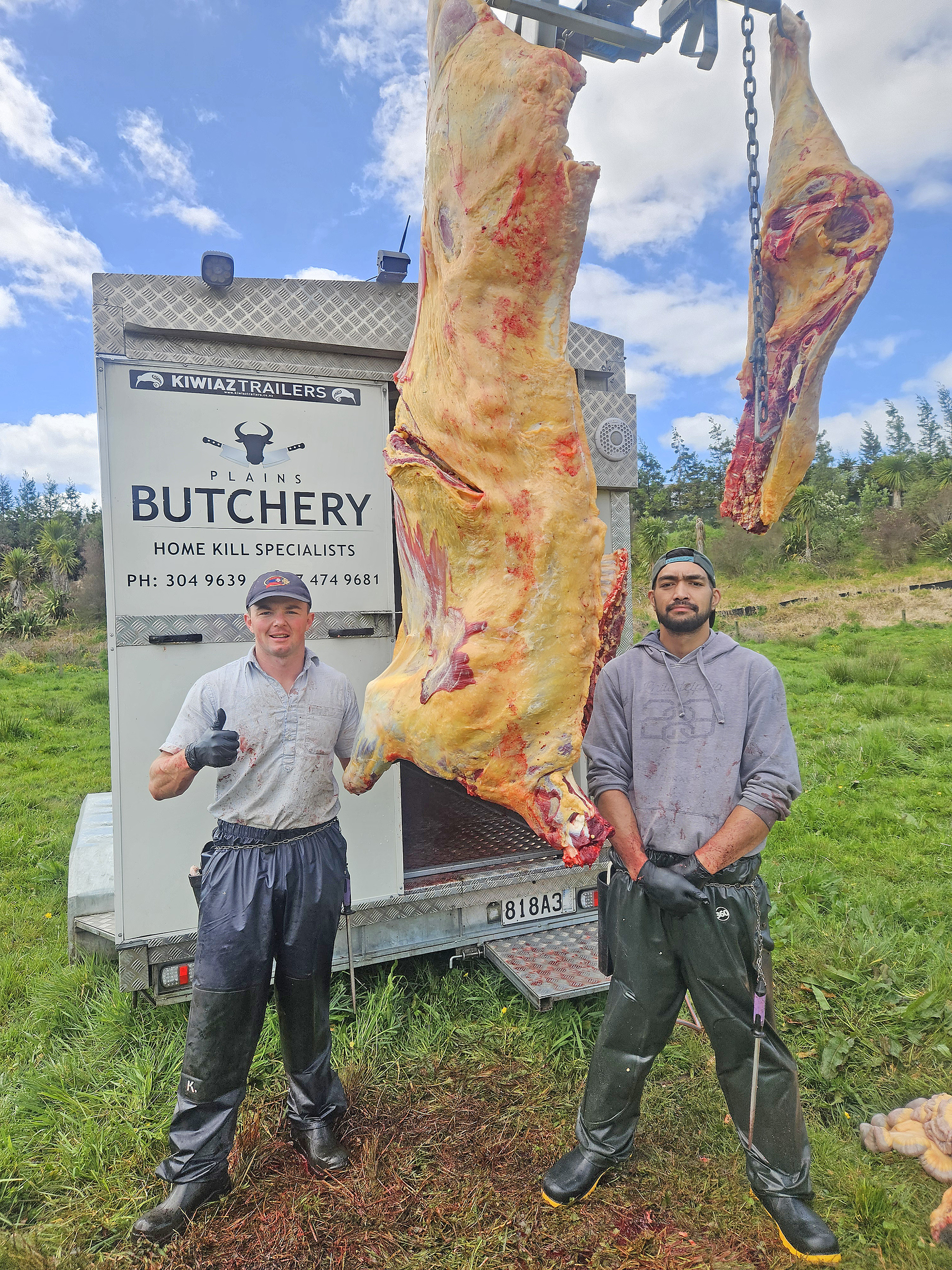Homekill boom serves up bigger opportunities

CARVING A NEW PATH: Edgecumbe butcher Toby Barkla, seen here with his slaughterman Judas Tipu, is establishing a regulated mobile abattoir to expand his business and better serve his community. Photo supplied
.
Homekill operators say they’re busier than ever — but there’s still plenty of meat on the bone.
Edgecumbe butcher and homekill specialist Toby Barkla is in the process of establishing a regulated mobile abattoir, which he sees as a way to expand his business while also benefitting his community.
“We’ve never been so busy. Everyone’s getting homekill done and going hunting because of the cost of meat.
“But there are much bigger opportunities for us rural butchers in setting up as micro and mobile abattoirs.
“Me and two other staff are sitting our meat inspector course and I’m going to build a new mobile abattoir unit, built to MPI food safety requirements.
“It means everything we kill will be fully regulated and inspected, so we can utilise and sell every part of the animal — all those hearts, livers, kidneys, and tripe, as well as the meat,” Barkla says.
At present, unless certified as a micro abattoir, homekill operators can process meat and by-products only for the animal’s owner.
The rules are strict — it can’t be sold, bartered or traded — leaving butchers like Barkla restricted despite strong customer demand.
Mr Barkla, who owns Plains Butchery and is a member of Federated Farmers’ rural butcher executive, said transitioning to a micro abattoir wasn’t cheap or simple, but he viewed the investment as necessary.
“The cost and training are all about keeping food safety at the highest level, so no one gets sick. I’m all in favour of that.
“The micro abattoir space is really exciting, and it’s a chance for smaller operators to step up and show what we can do for our communities.
“When we’re fully operational, people can literally ring up and order a whole or half beast, fully legal. You’re eating the best New Zealand has to offer. It’s a real goer.”
Ashburton butcher Mike Hanson, who runs Netherby Meats and is on Federated Farmers rural butcher executive, also says business is humming.
Like Mr Barkla, he’s excited by the opportunities but says he’d like to see the rules eased so it’s easier to set up as a micro abattoir.
“As rural butchers and homekill specialists, we want to keep serving our communities, but it’s very expensive and complicated to get a micro or mobile abattoir off the ground,” Mr Hanson said.
“With so many small abattoirs shutting down, farmers will soon really struggle to get stock killed locally. Unless rules change, there’s no way to legally sell or trade local meat in those areas.”
One of the main hurdles is the inspection requirement. Current meat inspection qualifications are designed for large-scale export plants, not small rural businesses.
To get qualified, operators face around $30,000 in costs and six months of part-time study — a barrier too high for most small-scale butchers.
“If they don’t have the qualification, they must pay a veterinarian to inspect each animal before slaughter,” Mr Hanson said.
“That quickly becomes too costly for businesses operating at a small scale.”
Federated Farmers has been working with New Zealand Food Safety and AsureQuality to find practical solutions.
The organisations have jointly recommended an alternative set of qualifications tailored to small-scale domestic operations — skills that maintain food safety while removing unnecessary barriers.
“Getting these rules right would give butchers, farmers and local communities more control,” he said.
“It would let new businesses get off the ground and help communities feed themselves without having to rely only on big meat works miles away.”
Another hot topic is what happens to by-products such as offal, organs, and bones. Disposal has become increasingly expensive as commercial collection services decline.
“By-product disposal is a real challenge,” Hanson says.
“Offal, especially pork, is expensive to get rid of because the rendering plants won’t take it in some areas. A lot ends up going to landfill, which feels like such a waste.”
Mr Barkla said mobile abattoirs provided a safe, legal solution.
“With homekill, you can’t use dog bones or offal because it’s unregulated. There’s good reason for that — none of it is tested, and if people took it home to cook, they could get crook if the animal had an infection.
“With a mobile abattoir, everything is done in a regulated, clean environment, so we can safely use all parts of the animal.”
Federated Farmers is exploring a model where homekill operators could carry out initial inspection on-farm, return the meat to the client, and send offal to a regulated pet food processor — maintaining food safety while reducing waste.
For Mr Hanson and Mr Barkla, the goal is simple: rules that work for small-scale rural operations, support local communities, and ensure every part of the animal is put to good use.
“Micro and mobile abattoirs have the potential to transform our industry,” Mr Barkla said.